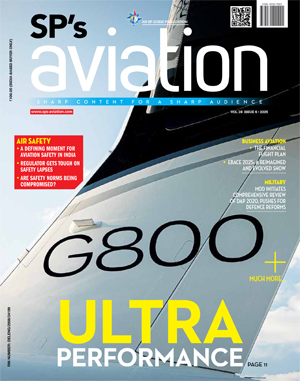INDIAN ARMED FORCES CHIEFS ON OUR RELENTLESS AND FOCUSED PUBLISHING EFFORTS

The insightful articles, inspiring narrations and analytical perspectives presented by the Editorial Team, establish an alluring connect with the reader. My compliments and best wishes to SP Guide Publications.

"Over the past 60 years, the growth of SP Guide Publications has mirrored the rising stature of Indian Navy. Its well-researched and informative magazines on Defence and Aerospace sector have served to shape an educated opinion of our military personnel, policy makers and the public alike. I wish SP's Publication team continued success, fair winds and following seas in all future endeavour!"

Since, its inception in 1964, SP Guide Publications has consistently demonstrated commitment to high-quality journalism in the aerospace and defence sectors, earning a well-deserved reputation as Asia's largest media house in this domain. I wish SP Guide Publications continued success in its pursuit of excellence.
- The layered Air Defence systems that worked superbly, the key element of Operation Sindoor
- Operation Sindoor | Day 2 DGMOs Briefing
- Operation Sindoor: Resolute yet Restrained
- India's Operation Sindoor Sends a Clear Message to Terror and the World – ‘ZERO TOLERANCE’
- Japan and India set forth a defence cooperation consultancy framework, talks on tank and jet engines
Work in Unison

The urgent need today is for the government to create an industry-friendly and financially pragmatic environment
Towards the end of 2011, Kingfisher Airlines took the civil aviation industry and the travelling public by surprise with the rather sudden announcement of the plan to wind up Kingfisher Red, its highly popular low-cost arm. The decision was more ironic than surprising as it was Air Deccan, predecessor to Kingfisher Red, that in August 2003 had ushered in the low-cost concept on to the Indian civil aviation scene. Besides, in keeping with the trend, a large portion of the capacity of Kingfisher was dedicated to low-cost operations. Also other low-cost carriers such as IndiGo, SpiceJet and GoAir were reportedly doing relatively better. Of these, only IndiGo is believed to be consistently in profit though its financial performance is not available in public domain. But the most notable incongruity in the decision was that Sanjay Agarwal, Chief Executive Officer (CEO) of Kingfisher Airlines who had been eminently successful while heading the low-cost carrier SpiceJet, should be asked to preside over the burial of a low-cost carrier.
The decision to close down Kingfisher Red was interpreted initially as a signal that the low-cost model was perhaps no longer viable. However, after some high voltage interaction with the media, it became clear that the decision by Kingfisher Airlines to exit the low-cost segment was precipitated by internal organisational contradictions arising out of running two widely differing and diverse business models under one management. The low-cost model was apparently impinging on high-end clientele of Kingfisher’s full-service segment. The Kingfisher was therefore not interested in competing in the low-cost segment.
But the problems for Kingfisher did not end with the demise of Kingfisher Red. With a debt burden of Rs. 7,500 crore and cumulative losses of Rs. 5,000 crore, the airline was in the throes of a serious financial crisis. 20 of its 64 aircraft were grounded, some for alleged default in the remittance of lease charges and others for inability to pay for spares or maintenance costs. Leasing companies had threatened to repossess their aircraft. The airline also owed substantial sums of money to the Airports Authority of India and the oil companies who withdrew credit facilities. Meanwhile, pilots were reported to be deserting the airline in hordes without giving the mandatory six months notice. The Directorate General Civil Aviation (DGCA) refused to intervene as pilots had quit the airline after salaries were withheld for two months. As the airline was obviously guilty of breach of contract, the mandatory notice period rightfully could not be enforced. The combined effect of these factors was widespread cancellation of flights and loss-making routes leaving passengers in the lurch and the DGCA fuming. Kingfisher’s business model was grossly flawed.
At the behest of the Ministry of Civil Aviation, the DGCA carried out a financial audit of all Indian carriers in the last quarter of 2011. While the audit team found irregularities with all, the financial distress particularly in Kingfisher Airlines was so acute that it could have serious ramifications for air safety. The DGCA was of the view that the inadequacies and deviations observed were serious enough to warrant cancellation of operating licence. As expected, there was instant and vehement denial by Kingfisher reiterating that the airline was perfectly safe to fly and that it would not close down. IndiGo also came up with a similar response refuting the audit report. Along with the others, the management of Kingfisher Airlines was summoned by the DGCA, briefed on the audit report and was directed to submit plans for remedial action indicating clear timelines for implementation.





